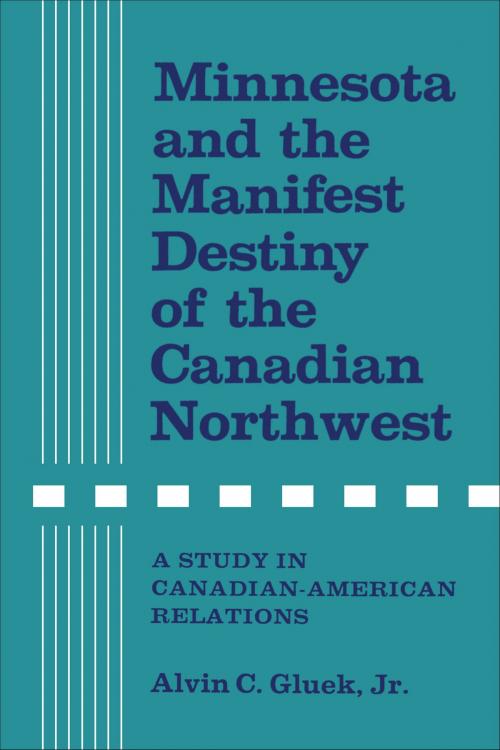Minnesota and the Manifest Destiny of the Canadian Northwest
A Study in Canadian-American Relations
Nonfiction, History, Americas, Canada, United States| Author: | Alvin C. Gluek Jr. | ISBN: | 9781487597627 |
| Publisher: | University of Toronto Press, Scholarly Publishing Division | Publication: | December 15, 1965 |
| Imprint: | Language: | English |
| Author: | Alvin C. Gluek Jr. |
| ISBN: | 9781487597627 |
| Publisher: | University of Toronto Press, Scholarly Publishing Division |
| Publication: | December 15, 1965 |
| Imprint: | |
| Language: | English |
From the Lake of the Woods to the Rocky Mountains, only a line separates Canada from the United States—the mute evidence of each nation's manifest destiny. As a boundary, the 49th parallel is entirely manmade and will never really divide the Northern Great Plains, for it is a region at once geographically and historically united. Certainly from 1821 to 1869-70, the years limiting this study, a unity was most evident; the history of the British Northwest was inextricably bound up with that of the American Northwest.
Professor Gluek gives here a detailed and engrossing account of the complex relationship that developed between St. Paul and the Red River Settlement from 1821 to 1870. During this time, despite attempts by the Hudson's Bay Company to discourage free trade, the Red River Valley became the bridge upon which a broad economy was built. The economic bond was strengthened by the 1850's when Minnesota's transportation system to the outside world became so efficient that even the Company began to use it. Minnesotan dreams of engrossing all the commerce of the Northwest, and perhaps gaining Manitoba by default, were frustrated by the failure to renew the Reciprocity Treaty of 1854 and Canada's efforts to obtain Rupert's Land. Minnesota became militantly expansionist, but, despite her pleas in the late 1850's and 1860's for active United States intervention, little was really done. With distinctly superior diplomatic skills, Canada's first Prime Minister, Sir John A. Macdonald, bested his American adversaries, won the Northwest for his young country, and assured it of transcontinental greatness.
All of those who are interested in Canadian and American history—both the professional historian and everyone who is fascinated by the romance of the West—will enjoy this lively, well-written record of the people and the events of an important period in Canadian-American relations.
From the Lake of the Woods to the Rocky Mountains, only a line separates Canada from the United States—the mute evidence of each nation's manifest destiny. As a boundary, the 49th parallel is entirely manmade and will never really divide the Northern Great Plains, for it is a region at once geographically and historically united. Certainly from 1821 to 1869-70, the years limiting this study, a unity was most evident; the history of the British Northwest was inextricably bound up with that of the American Northwest.
Professor Gluek gives here a detailed and engrossing account of the complex relationship that developed between St. Paul and the Red River Settlement from 1821 to 1870. During this time, despite attempts by the Hudson's Bay Company to discourage free trade, the Red River Valley became the bridge upon which a broad economy was built. The economic bond was strengthened by the 1850's when Minnesota's transportation system to the outside world became so efficient that even the Company began to use it. Minnesotan dreams of engrossing all the commerce of the Northwest, and perhaps gaining Manitoba by default, were frustrated by the failure to renew the Reciprocity Treaty of 1854 and Canada's efforts to obtain Rupert's Land. Minnesota became militantly expansionist, but, despite her pleas in the late 1850's and 1860's for active United States intervention, little was really done. With distinctly superior diplomatic skills, Canada's first Prime Minister, Sir John A. Macdonald, bested his American adversaries, won the Northwest for his young country, and assured it of transcontinental greatness.
All of those who are interested in Canadian and American history—both the professional historian and everyone who is fascinated by the romance of the West—will enjoy this lively, well-written record of the people and the events of an important period in Canadian-American relations.















